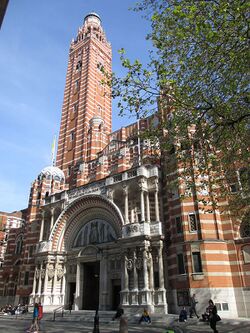Enlightened Aroman Church
Enlightened Aroman Church | |
|---|---|
 Cathedral of Christ Pantocrator, Europatorion | |
| Abbreviation | EAC |
| Classification | Aroman |
| Scripture | Septuagint, New Testament |
| Polity | Episcopal |
| Catholic Patriarch | Cosmas I |
| Region | Western Europa, other populations wurldwide |
| Language | |
| Founder | Optatus |
| Origin | 683 Sozaclea |
| Separated from | Aroman Catholic Church, Aroman Orthodox Church |
| Members | c. 415 million |
| Other name(s) | Aroman Church, Aroman Christian Church, Enlightened Orthodox Catholic Church, Optatan Church |
The Enlightened Aroman Church, also known as the Aroman Church, is the largest Christian Church and largest religious denomination on Eurth, with over 415 million adherents spread across Europa and the rest of Eurth, although mainly located in the Occidental nations of Adaptus, Euandria, Sporsia, Tagmatium and surrounding nations. It operates as a communion of autocephalous churches, each governed by its bishops in local synods. As with the Catholic Church, there is no central authority, although unlike the Catholic Church's Diarchy, there has never been a truly defined relationship between the various churches. The Catholic Patriarch of Europatorion is recognised to be the primus inter pares (“first among equals”) by all the bishops of the Church and as the representative and spiritual leader of all Enlightened Aroman Christians. However, the Patriarchs of Arome and Tzius claim a “joint first” position with that of Europatorion, as the former is the historic and traditional heart of Christianity on Eurth and the latter as the oldest of the ancient Heptarchic Patriarchates in the hands of the Aroman Church. Although not the oldest Christian denomination on Eurth, the Enlightened Aroman Church is certainly not the youngest, and it has played a very prominent role in the history and culture of Europa, especially the Occident, Amutia and Burania. The Enlightened Aroman Church officially calls itself the Enlightened Orthodox Catholic Church. The Aroman Church is also called the Optatan Church and its adherents Optatans, after the bishop Optatus, who was its main driving force before and during the Enlightenment in the late 600s.
The theology of the Aroman Church is based on sacred tradition. This incorporates the nine ecumenical councils, the Scriptures, and the teachings of the Church Fathers. It holds that it is the one, holy, catholic, apostolic church that was established by Jesus Christ and that the bishops of the Aroman Church are the successors of the apostles of Jesus. The Church holds that it practices the original Christian faith, as passed down to it by sacred tradition. It is not centrally organised but a network of autonomous and autocephalous churches. Several of the churches that constitute the Church are recognised as more senior and accorded the honour of being referred to as “Patriarchates”. It recognises seven major sacraments, of which the Eucharist is the main one, celebrated liturgically in synaxis. The Church teaches that through consecration invoked by the priest, the bread and wine become the body and blood of Christ. The Virgin Mary is honoured in the Enlightened Aroman Church as the God-Bearer and honoured in devotions.
The most significant difference between the Aroman Church and the other major Christian denominations on Eurth is its practice of aniconism, and it is quite a stark contrast to the Catholic, Qubdic and Orthodox Churches. This comes from the Old Testament Commandment forbidding the worship of graven images and the view that the icons that had been common in the State Church of Arome were nothing more than a continuation of the pagan images used before the Christianisation of the Aroman Empire. This belief, originating in the north of Tagmatium, spread south through the empire at a time of widespread religious, social and political turmoil. Optatus, the bishop of Sozaclea, was the driving force of this, along with a core of followers. Under the leadership of Optatus, the new branch of Christianity was able to unite much of the empire behind it and convinced the general Mikhael to replace the corrupt hierarchy of the empire. This led to the followers of Optatus becoming the replacement state church by 683CE, when Mikhael was crowned as emperor by Optatus in the Aroman capital of Europatorion. However, the final act against the old State Church was in 704CE, when Pope Calrissius I was driven from Arome after a brief siege.
The majority of Aroman Christians live in the Occident, northern Amutia and western Burania, with smaller populations wurldwide. Most of the population is located in Tagmatium and Adaptus or areas that were formerly ruled by the Aroman Empire but have now formed independent nations. These include the nations of Akwisia, Suverina, Lysia, Euandria and Sporsia. Other populations exist in areas that were influenced by the Aroman Empire through close contact, such as Qubdi and Ebrary. The populations present beyond the former borders of the Aroman Empire and the Occident, such as in the New Wurld or southern and eastern areas of Europa, are there through migration, conversions, or missionary activity.